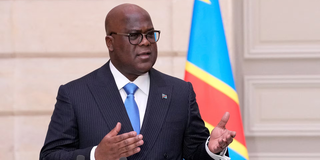
President Felix Tshisekedi of the Democratic Republic of Congo.
The 19th Francophonie summit ended without Congolese President Felix Tshisekedi, whom reports indicated left in a huff, angry at French President Emmanuel Macron’s failure to mention the war in the Democratic Republic of Congo (DRC) in a speech he made about conflicts shaking the world, especially French-speaking countries.
Then Tshisekedi boycotted the closed-door meeting between several world leaders and a lunch hosted by the Secretary General of the OIF (Organisation Internationale de la Francophonie), Louise Mushikiwabo.
"It's a culpable omission", said government spokesman Patrick Muyaya, adding that “the DRC, being the largest French-speaking country, its serious humanitarian crisis could not have been omitted by the French president.”
"Let there be no misunderstanding. Yesterday, I said it myself, I was only fragmentary in the references. There are many crises, tensions and wars that I did not mention,” President Macron had explained, when questioned by a journalist.
“We are very clearly encouraging the DRC and Rwanda to reach an agreement within the framework of Angolan mediation, and the OIF must play a role in supporting regional efforts in this respect, and I have said this successively to President Tshisekedi and President Paul Kagame.
“As far as France is concerned, we have always been clear, and I have said it again to both of them, that we are calling for the withdrawal of the M23 and Rwandan troops. We also call for the dismantling of the FDLR and all armed groups in the DRC, and for an end to hate speech.”
The DRC and Rwanda are both members of the Francophonie, although the latter now uses English as official language. The conflict between these two states occasionally affects the international organisation of the Francophonie.
In July 2023, the Congolese authorities refused to invite Louise Mushikiwabo, Secretary General of the Francophonie and former foreign minister in Rwanda, to Kinshasa for the ninth Francophonie Games.
In November 2022, at the 18th Francophonie summit in Tunisia, the former Congolese prime minister Sama Lukonde refused to be in the last group photo, arguing that he did not want to pose alongside President Kagame.
In France, Macron called on the two parties in conflict to find the path to peace through the political process for "the full return of the sovereignty and territorial integrity of the DRC."
The peace process has succeeded in establishing and maintaining the ceasefire. But the risk of escalation is still there.
At the Luanda peace process, the DRC has denounced "the lack of a sincere commitment on the part of Rwanda". The Congolese Minister of Foreign Affairs, Thérèse Kayikwamba, claimed that there are obstacles holding up the Luanda process and the adoption of an agreement proposed by the Angolan mediators. The peace plan is based on two components, says Kayikwamba.
“These are the neutralisation of the FDLR and the withdrawal of Rwandan troops from the DRC. FDLR are armed remnants of the perpetrators of the 1994 Genocide against the Tutsi
"In April 2024, the DRC drew up its plan to neutralise the FDLR. On the other hand, Rwanda's contribution on the withdrawal boils down to a promise of withdrawal without any guarantee or concrete details... Worse still, Rwanda is making its withdrawal conditional on the neutralisation of the FDLR. For this process to be meaningful, these two aspects must be implemented simultaneously", said the Congolese Foreign Affairs minister.
On the Rwandan side, Foreign Minister Olivier Nduhungirehe accused the Congolese government of blocking the peace process by opposing “the harmonised plan for neutralising the FDLR and lifting Rwandan defence measures, as adopted by Angolan, Congolese and Rwandan experts on 30 August 2024 in Rubavu.”
Angola has been mediating the tensions, with endorsement from the African Union and other regional bodies, seeking to see truce between Rwanda and DRC.
Luanda sees this as a crucial step to ending conflict in the eastern DRC, where hundreds of armed groups operate. But the largest of them, M23, is said to be heavily backed by Rwanda, according to a UN panel of investigators as well as the US, France and DRC.
Kigali on its part argues Kinshasa is protecting the FDLR. Both sides deny the charges.


